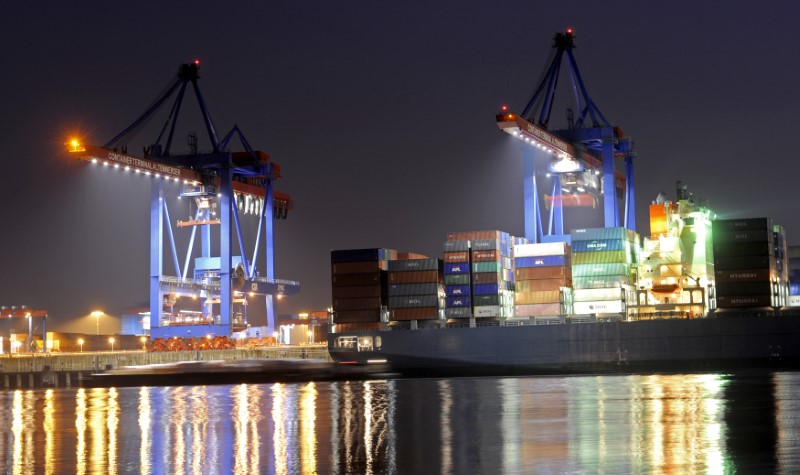By Joseph Nasr
BERLIN (Reuters) - German trade activity slowed abruptly in June, adding to signs that demand in leading economies may be starting to flag just as central banks consider scaling back years of stimulus.
Exports from Europe's biggest economy fell by 2.8 percent, the biggest drop since August 2015 and one that ended five straight months of growth. Imports sank by 4.5 percent, the biggest drop since January 2009, the Federal Statistics Office said.
Exports and imports in China, which along with Europe has been driving an increasing share of global growth this year, grew much less than expected in July, data from Beijing showed earlier on Tuesday.
Weaker import growth in the world's second-largest economy could be the first tangible sign of a long-expected slowdown there. "We have to be cautious about the import outlook," said Raymond Yeung, chief economist for Greater China at ANZ in Hong Kong, while noting that bad weather may have been a factor.
The global growth equation has shifted with political ructions in Washington and beyond that have stymied stimulus policies being pushed by U.S. President Donald Trump.
Meanwhile further rate hikes remain on the Federal Reserve's horizon as debates intensify among European Central Bank and Bank of Japan policymakers about whether to rein in their stimulus programs.
The German data, which contrasted with expectations in a Reuters poll for a 0.3 percent drop in exports and a 0.2 percent gain in imports, drove the country's seasonally adjusted trade surplus to a 10-month high.
That figure of 21.2 billion euros is likely to lead to pressure on the government in Berlin to boost spending on investments as a way to support the economic recovery in other countries - a call made by the International Monetary Fund last month.
Germany's wider current account surplus, which measures the flow of goods, services and investments, rose to 23.6 billion euros after a downwardly revised reading of 16.0 billion euros in May, unadjusted data showed.
ECONOMIC STABILITY
Chancellor Angela Merkel, expected to win a fourth term in a national election next month, is campaigning on a platform of economic stability, and her conservatives promised tax cuts worth some 15 billion euros annually as well as increased spending on infrastructure, defense and security.
The government expects the economy to grow 1.5 percent this year, down from 1.9 percent in 2016, which was the strongest rate in five years.
Construction and state spending have already, along with consumption, provided most of the growth impulse, supported by the low interest rate environment created by the ECB.
"Even though this morning’s trade data add to a disappointing month for German industry, we don’t think that the German economy has suddenly passed its peak," ING Bank economist Carsten Brzeski said.
"Instead, strong confidence indicators point to a continuation of the recovery. Also, some kind of investment boost after the elections combined with the gradual recovery of private investment already this year should extend an already mature business cycle of the German economy well into 2018."
The Ifo institute said on Tuesday it expected the economy to grow 0.8 percent in the second quarter.

Industrial orders rose twice as much as expected in June, supported by strong domestic demand, and while industrial output fell in June, they grew in the second quarter overall.